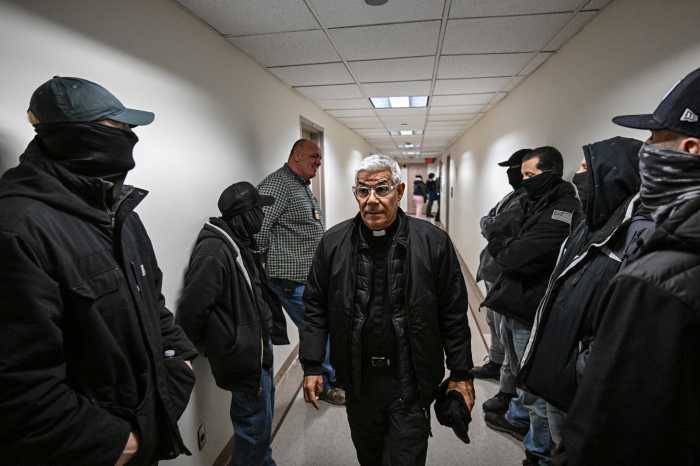The ads promised that if you invested your money with a real estate company in Jackson Heights, you would get an annual return of 12 percent and if you brought in new investors, you would earn 3 percent more on your investments.
It sounded too good to be true and unfortunately for dozens of investors, it was.
The company that lured them, Buyersnet Real Estate Corp., now allegedly owes about half a million dollars to over a dozen claimants. On Thursday, October 6, these investors gathered, seeking their money back, at 37-06 82nd Street in Jackson Heights, in front of the office of Buyersnet.
Buyersnet is a division of a bigger company called Tael Group, according to the Tael web site, www.taelgroup.com. The company had offices throughout western Queens, but all of them have closed down except for the Jackson Heights location, said Yonel Letellier, chief of staff for Assemblymember Jose Peralta. For the past year-and-a- half, Peralta’s office has received numerous complaints from investors who have allegedly lost money in the Buyersnet scam.
According to the Buyersnet web site, www.buysell123.com, the company had several investor programs, among them Guaranty Interest Option Plan. To earn this plan’s annual 12 percent interest, which was to be computed and payable every three months, the investors had to lend the company at least $500.
The company allegedly used those loans to buy real estate properties, services or products. The investors were told they could withdraw their money at any point in time, but they were warned that interest would not be prorated and the issuance of a refund check for the individuals’ original investment could take up to 30 days. All of these conditions appear in the contracts signed by investors and Buyersnet.
According to Peralta, the company tended to follow its own rules, issuing refunds promptly when dealing with new investors, who generally started with smaller amounts, in order to lure them in deeper and encourage them to bring in more investors.
However, once investors got deeper, with amounts like $10,000 or more, the company began stringing them along, Peralta explained. When people asked for their money, Buyersnet would ask for another month; when it finally issued a check, that check would bounce, Peralta added.
This is exactly what happened to Rafael Baquero, 59, who lent Buyersnet $60,000. A friend told him about the prospective high rate of return and he believed it.
The branch of the company he dealt with looked legitimate - it was housed in a tall sleek Queens Plaza building in Long Island City, he said. “A lot of people were going to the office,” he recalled.
Baquero invested his life’s savings, left Jackson Heights and went to Florida, where he bought a house. He was planning to make mortgage payments with his Buyersnet profits. However, all he got back is $10,000, he said. “I might lose my house. I can’t continue making payments,” Baquero said.
Every time he approached the company for money, they had excuses, according to Baquero. “They said, ‘Sorry, we have been making bad deals; we have lost money in deals in Panama and Puerto Rico.”
Milton Coba, 31, a server from Manhattan, is owed $10,000. Two years ago, he was looking for a job when he spotted an opening at Buyersnet advertised in a newspaper. Coba went to the company’s Jackson Heights office to find that the job offer was for a real estate agent. It did not suit him. Nevertheless, another offer did suit him - to invest with the company.
“They said, ‘We’ll pay you more interest than the regular bank.’ So I thought, ‘Maybe I can make some money over here.’ ” Soon, they asked him to bring in more investors, promising him that this would add an additional three percent to his return. He was not able to bring in any people though, nor was he able to withdraw his money. “The last time I spoke to them I cursed at them, I screamed,” Coba said.
One thing he did get is a lesson. “There is no easy money.”
Buyersnet also allegedly asked employees to invest with the company and to attract investors, said people who used to work there. One of them is 46-year-old Amparo Luna, from Elmhurst, who joined the company in 2005 in its Long Island City office as a manager of real estate projects. Soon after Luna started working, she claims, the company asked her to bring in investors. Then they asked her to invest her own commissions and salary. She said she ended up loaning the company $1,500, most of which she got back, except for $500.
“They take the money of people who are immigrants. They know these people fear to go to the authorities,” Luna said.
Besides losing money, what Luna and other Buyersnet investors have in common is that they are Latino. In fact, the company’s Spanish-speaking staff was specifically targeting this group of people, said a woman who used to work for Buyersnet as a real estate agent and wished to remain anonymous. When a couple of times she tried to attract American investors, they all dismissed the program as a scam, the woman recalled.
“Just because they speak Spanish, they may not be safe; they may not have your best interest in mind,” warned Damaris Mone, spokesperson for Peralta.
The owner of the company, Giancarlo Giuseppe, could not be reached for comment.
However, an anonymous Latino investor, who said he has loaned the company $100,000 and is a friend of Giuseppe, said: “He [the owner] is a man of integrity. His lawyer told him to screw everybody, but he said he wouldn’t consider bankruptcy; he wants to repay people.” The man said he’s confident Buyersnet will refund him sooner or later.
Currently, the offices of Queens District Attorney Richard Brown and Attorney General Andrew Cuomo are investigating Giuseppe’s company.
































